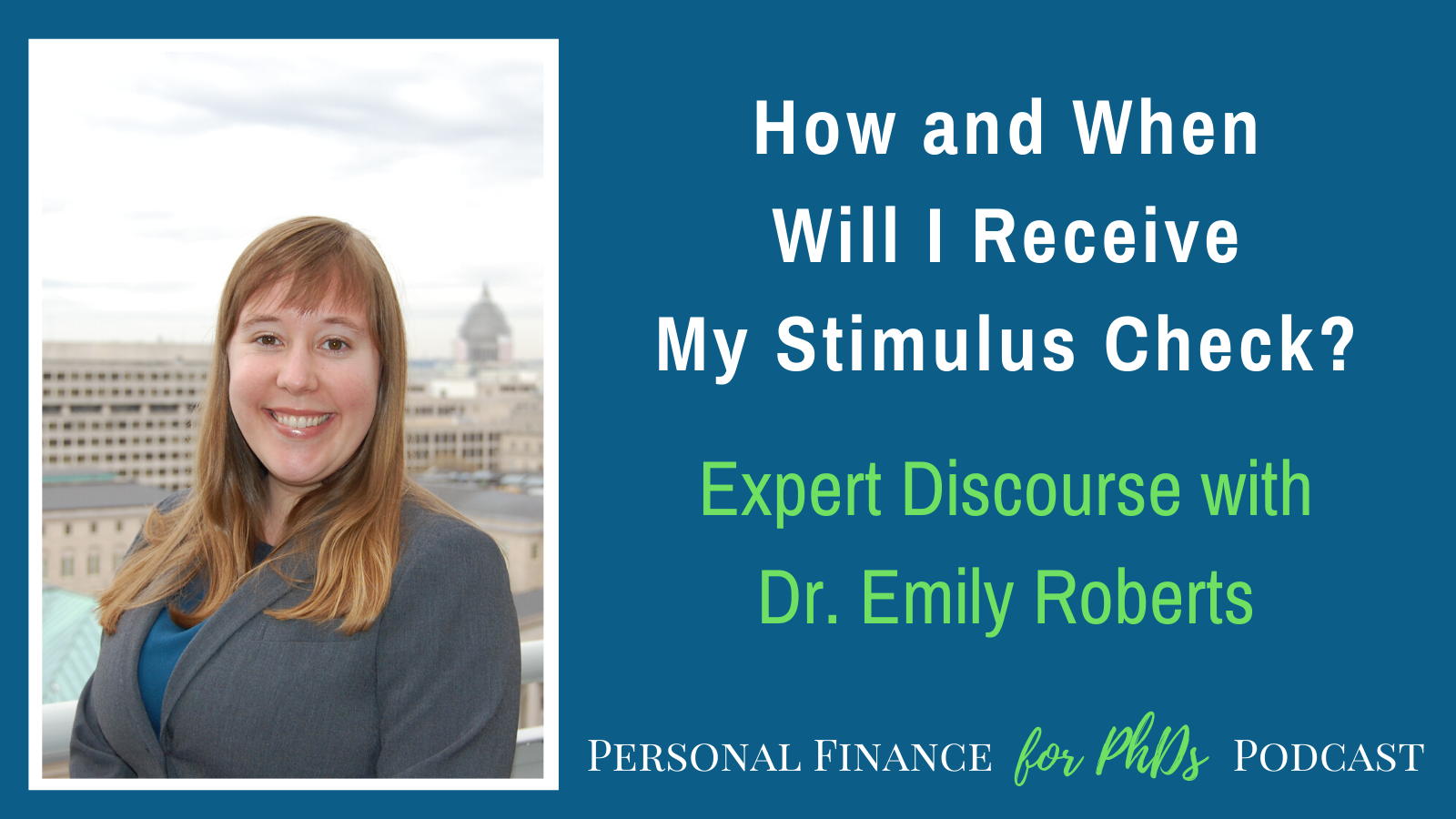In this episode, Emily explains how and when the stimulus checks from the CARES Act will be sent to qualifying individuals. She points to new IRS tools to help you track your payment and ensure that your payment arrives in a timely fashion. A minority of citizens and residents may need to submit their 2019 tax returns or other information prior to receiving their checks.
Links Mentioned in the Episode
- IRS Economic Impact Payments
- IRS Get My Payment
- IRS Non-Filers: Enter Payment Here
- PFforPhDs Tax Center
- [Webinar] The Coronavirus Crisis and Your PhD Finances
- PFforPhDs Podcast Hub

Welcome to the Personal Finance for PhDs Podcast: a higher education in personal finance. I’m your host, Dr. Emily Roberts.
This is Season 5 Bonus Episode 2, and in this episode I will answer the question: How and when will I receive my stimulus check?
I’m recording this on April 15, 2020. The Coronavirus Aid, Relief, and Economic Security Act aka the CARES Act was signed into law a little less than three weeks ago, and one of the major components of the bill was economic impact payments aka stimulus checks sent to qualifying individuals.
Stimulus checks have just started arriving in people’s bank accounts this week. In fact, my family’s stimulus check showed up this morning.
If you are expecting a stimulus check but it hasn’t arrived yet, you are probably quite anxious to know when it will come and if there is anything that you need to do to hasten the process, so that is the subject of this podcast episode.
For most Americans, the stimulus check will be delivered automatically, without having to take any action. However, some people do need to take steps to receive the payment or to receive it sooner.
While you’re listening to this episode, I suggest you go to the URL IRS.gov/coronavirus/economic-impact-payments. That link will be in the show notes for this episode as well.
On that page you will find a link to the Get My Payment tool, which was launched earlier today. That is where you can check on the status of your stimulus check so you know when it will arrive. You can also provide the IRS with your banking information to enable direct deposit.
If you received a tax refund last year by paper check, chances are the IRS does not have the ability to directly deposit your stimulus check into your bank account. The same goes for if in the last two years you paid additional tax along with your tax return, which is common for fellowship recipients who don’t have automatic income tax withholding. In that case, you should use the Get My Payment tool to submit that information. If you’re eligible for a stimulus check but don’t have that direct deposit information on file, you’ll likely wait several months to receive your paper check rather than just days or weeks for the direct deposit.
If you were not required to file a tax return in 2019 or 2018, you should go to the other link on the webpage I referenced, which is called Non-Filers: Enter Payment Info Here and fill out the application. It is a very short form to collect your information so that IRS can issue the payment. You do not need to take this step if you receive Social Security retirement, disability, or survivor benefits or Railroad Retirement and Survivor Benefits.
For some of the younger members of my audience, perhaps 2019 was the first year in which you were ever required to file a tax return. In that case, according to the Get My Payment webpage, you do have to file your 2019 tax return to get your stimulus check. If you need help doing that, you can find all my best resources at PFforPhDs.com/tax.
Now, let’s say you qualify for a stimulus check but for some reason you don’t receive it or the one you receive is not as large as it should have been. You can rectify this on your 2020 tax return.
The stimulus money is technically a new refundable credit for 2020 paid out in advance of the tax filing season. Therefore, on your 2020 tax return, you can show that you should have received more of this stimulus money, and the IRS can add the missing money to the tax refund you receive in spring 2021.
If you are not sure if you are eligible for a stimulus check or have other CARES Act-related questions, I recommend purchasing the webinar I gave last Saturday, April 11. You can find the webinar page at PFforPhDs.com/CARES.
I’ll leave you with one final note about scams. IRS scams have run rampant in recent years, and the stimulus checks are an enormous opportunity for scammers. Please be vigilant against phishing or scam attempts both for yourself and your elderly loved ones, who are particularly vulnerable. The IRS will not ask you for your personal information via phone, text, email, or social media. Don’t open unexpected emails that appear to be from the IRS. Please report phishing attempts directly to the IRS.
That’s it for this episode! I’ll catch you again on Monday for our next regularly scheduled interview.
Listeners, thank you for joining me for this episode!
pfforphds.com/podcast/ is the hub for the Personal Finance for PhDs podcast. There you can find links to all the episode show notes and a form to volunteer to be interviewed. I’d love for you to check it out and get more involved!
If you’ve been enjoying the podcast, please consider joining my mailing list for my behind-the-scenes commentary about each episode. Register at PFforPhDs.com/subscribe/.
See you in the next episode, and remember: You don’t have to have a PhD to succeed with personal finance… but it helps!
The music is “Stages of Awakening” by Podington Bear from the Free Music Archive and is shared under CC by NC.
